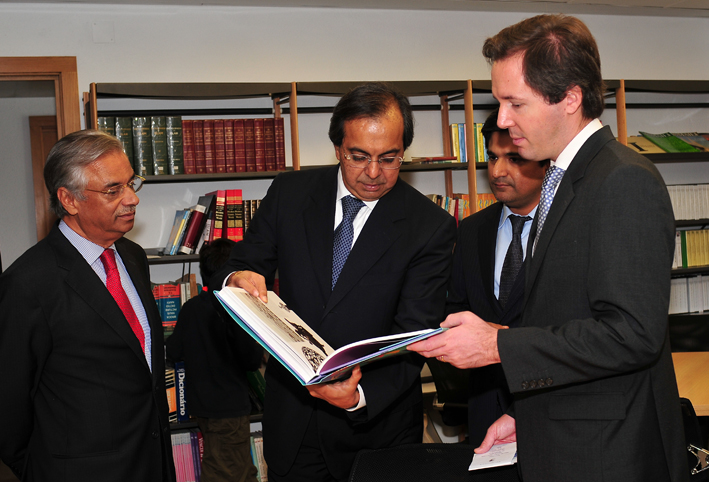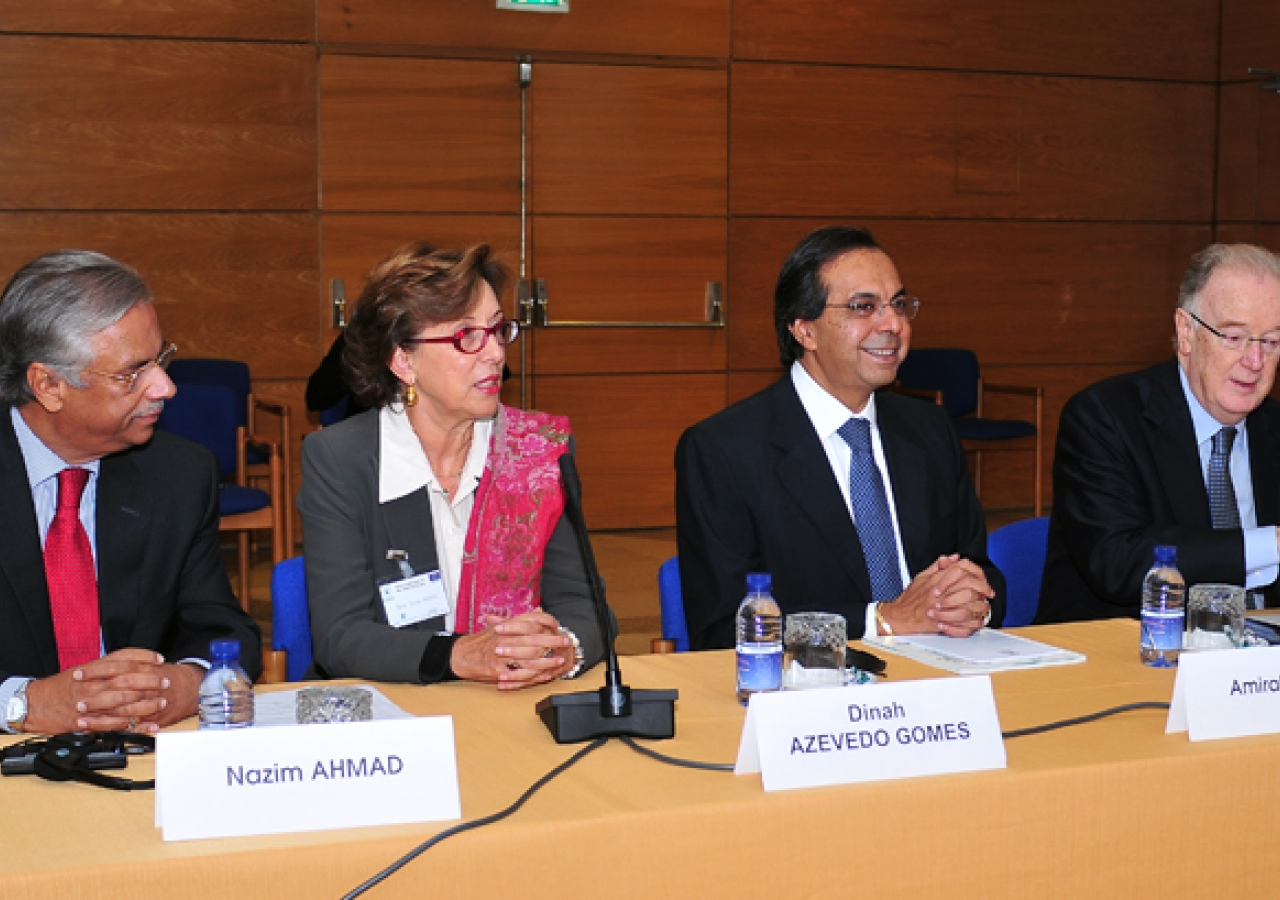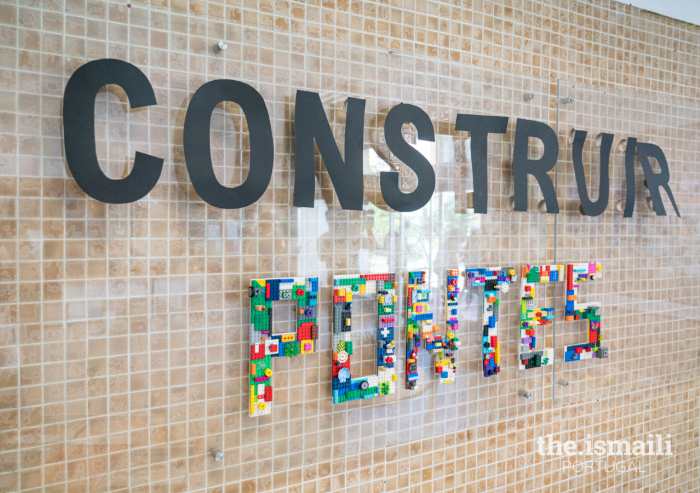 UN High Representative for the Alliance of Civilizations Dr Jorge Sampaio addresses the 2009 Lisbon Forum, which took place at the Ismaili Centre, Lisbon. Courtesy of the Ismaili Council for Portugal
UN High Representative for the Alliance of Civilizations Dr Jorge Sampaio addresses the 2009 Lisbon Forum, which took place at the Ismaili Centre, Lisbon. Courtesy of the Ismaili Council for PortugalDuring two days in November, the Ismaili Centre, Lisbon was the venue of the 2009 Lisbon Forum, an annual event of the North-South Centre. Focused on the “creation of a culture of human rights through education,” this year's gathering was organised in partnership with the United Nations Alliance of Civilizations and the Aga Khan Development Network.
Since 1994, the Lisbon Forum has provided an important platform for dialogue and the sharing of experiences, expertise and good practices between Europe and other continents – particularly the Middle East, Africa and the southern Mediterranean countries. The North-South Centre is an autonomous institution of the Council of Europe that seeks to provide a framework for North-South co-operation and to raise awareness around issues of global interdependence.
 AKDN Representative Nazim Ahmad, Ismaili Council for Portugal President Amirali Bhanji, Karim Vissangy, and Secretary of State of European Affairs of Portugal, Pedro Lourtie together in the library of the Ismaili Centre, Lisbon. Courtesy of the Ismaili Council for Portugal
AKDN Representative Nazim Ahmad, Ismaili Council for Portugal President Amirali Bhanji, Karim Vissangy, and Secretary of State of European Affairs of Portugal, Pedro Lourtie together in the library of the Ismaili Centre, Lisbon. Courtesy of the Ismaili Council for PortugalThe 2009 Lisbon Forum explored the role that education can play in the creation of a culture of human rights. In societies of diversity, education can teach people to acknowledge and explore their differences, and develop a sense of respect and appreciation for one another. Education targeted at girls can also improve conditions for women, and have a profound impact on a society's respect for the dignity of the human person without regard to origin, faith or gender. Respect of human dignity lies at the heart of the ethics of Islam and other faith traditions.
Drawing on some of its earliest experiences in education, the AKDN can attest to this. In Africa and Asia, the 48th Ismaili Imam, Mawlana Sultan Mahomed Shah Aga Khan III, established some 200 schools in the first half of the 20th century, and strongly emphasised the importance of educating girls. As a result, thousands of underprivileged girls grew into women who could look to their future with optimism. They were able to raise the social and economic status of their families and communities, and adapt in the face of turbulent change that came with modernity and independence.
 Dr Jorge Sampaio, UN High Representative for Alliance of Civilizations and Maud de Boer-Buquicchio, Deputy Secretary General of the Council of Europe share a conversation at the 2009 Lisbon Forum. Courtesy of the Ismaili Council for Portugal
Dr Jorge Sampaio, UN High Representative for Alliance of Civilizations and Maud de Boer-Buquicchio, Deputy Secretary General of the Council of Europe share a conversation at the 2009 Lisbon Forum. Courtesy of the Ismaili Council for PortugalThe Forum was chaired by Jorge Sampaio, UN High Representative for the Alliance of Civilizations and a former President of the Portuguese Republic. Delegates from all over the world as well as the diplomatic corps in Portugal attended the event. Among the high-profile participants were Maud de Boer-Buquicchio, Secretary-General of the Council of Europe, Thomas Hammarberg, Council of Europe Commissioner for the Human Rights, and António Costa, the Mayor of Lisbon. José Manuel Barroso, President of the European Commission, addressed the Forum through a video message, and a message was also presented on behalf of Professor Ekmeleddin Ihsanoglu, Secretary-General of the Organisation of the Islamic Conference.
As a representative of the organising entity and a special guest, AKDN Representative Nazim Ahmad was invited to address the Forum. He highlighted the close cooperation between the North-South Centre and the AKDN, describing contributions made in various areas of human development, including work in education and fostering pluralism in societies.
Forum participants agreed that human rights education has the potential to be “a tool of prevention in reducing incidences of human rights violations and conflict,” and should be integrated into formal education systems. However, it should equally be seen as a lifelong process, engaging youth and the broader public through informal learning opportunities.
 AKDN Representative Nazim Ahmad, Dinah Azevedo Gomes, Ismaili Council for Portugal President Amirali Bhanji, and UN High representative for the Alliance of Civilizations Dr Jorge Sampaio participate in the proceedings of the 2009 Lisbon Forum hosted at the Ismaili Centre, Lisbon. Courtesy of the Ismaili Council for Portugal
AKDN Representative Nazim Ahmad, Dinah Azevedo Gomes, Ismaili Council for Portugal President Amirali Bhanji, and UN High representative for the Alliance of Civilizations Dr Jorge Sampaio participate in the proceedings of the 2009 Lisbon Forum hosted at the Ismaili Centre, Lisbon. Courtesy of the Ismaili Council for Portugal







